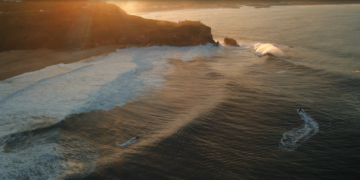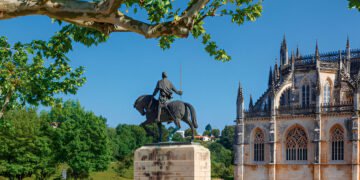Table of Contents
Introduction
The Algarve is the perfect summer escape, offering a variety of experiences. There are all kinds of beaches (with breathtaking sceneries for surfing, for naturism, in wild coasts or on picturesque fishing villages), monumental caves and rock formations to explore on boats, nearly-deserted dune islands, world-class golf courses, historical monuments, water parks, and entertainment for all ages. All this under abundant sunshine and at prices for all budgets. Don’t limit your stay to just one town, as the region is excellent for a multi-destination vacation. If you rent a car, you can explore the entire area in a few days, and by train or bus, you can reach most of the main towns. Below are the top twenty most fantastic attractions in the Algarve.

Many people put Benagil Cave at the top of their list of must-sees in the Algarve. It resembles a domed temple with an open skylight, as if Rome’s Pantheon inspired the forces of nature. The natural wonder encloses a beach and is accessed by boat through two arched openings.
Benagil Cave
- Address: Benagil Beach, Lagoa, Algarve, Portugal
Praia da Marinha and the Seven Hanging Valleys
Praia da Marinha is widely considered the must-see beach in the Algarve and one of the most beautiful in the world. It’s a natural spectacle of intriguing rock formations and a popular advertisement backdrop. The “Seven Hanging Valleys” trail offers breathtaking views and continues to other beaches to the west, including Praia de Benagil.
- Address: Caramujeira, 8400-403 Lagoa, Portugal
Ponta da Piedade and Lagos’ Coastline
The Ponta da Piedade headland is one of Portugal’s most photographed and beautiful sites. Its rock formations, caverns, and caves are best seen on boat or kayak tours, but a long staircase with 182 steps also offers access down to water level. From here, you can see the entire Lagos coastline and beyond to Sagres.
- Address: Ponta da Piedade, Lagos, Algarve, Portugal
Sagres and the End of the World
Sagres retains an end-of-the-world feel. It is located by Cape St. Vincent, the southwesternmost tip of Europe. It has a laid-back, bewitchingly calm atmosphere and dramatic scenery. The fortress here is where Prince Henry the Navigator planned the voyages that mapped much of the globe.
- Address: Sagres, Vila do Bispo, Algarve, Portugal
Ria Formosa Natural Park
Ria Formosa is a maze of islands, lagoons, dunes, and marshes stretching for about 60km in eastern Algarve. It’s a natural park visited for the beaches on the islands, wildlife spotting, and hiking. Ferries to the islands depart from Faro, Olhão, and Tavira.
- Address: Ria Formosa, Algarve, Portugal
Sun and Fun in Albufeira
Once a quiet fishing village, Albufeira is now one of Portugal’s top tourist destinations, known for its splendid beaches and lively nightlife. It has nearly two dozen beaches, from crowded ones by the Old Town to secret ones along its coastline. Water parks nearby keep children and adults entertained.
- Address: Albufeira, Algarve, Portugal
Faro Old Town and Deserted Island
Faro is the capital of Algarve and home to the international airport. The mostly pedestrianized Old Town is delightful, with stork nests, orange trees, and historic monuments. Ferries from Faro take you to a deserted island with a beautiful beach.
- Address: Faro, Algarve, Portugal
Costa Vicentina
Costa Vicentina is Europe’s best-preserved coastline, offering a wild, virgin landscape of rugged headlands, sea stacks, jagged cliffs, and wind-blown dunes. It’s a haven for naturists, surfers, and anyone who craves space and unspoiled nature. Beaches like Praia da Bordeira, Praia da Amoreira, and Praia de Odeceixe are top spots.
- Address: Costa Vicentina, Algarve, Portugal
Church of St. Lawrence
The Church of St. Lawrence in Almancil is one of Algarve’s most significant cultural treasures. The interior is a masterpiece of Portuguese art and European baroque, combining gilded wood and ceramic tiles. Built in 1730, it features monumental tile panels illustrating scenes from St. Lawrence’s life.
- Address: Igreja de São Lourenço, Almancil, Algarve, Portugal
Silves Castle
Silves Castle is the largest and best-preserved castle in Algarve, originally built by the Moors in the 10th century. The red sandstone construction includes two cisterns, one of which was originally a Roman well. It’s considered the most significant Moorish building in Portugal.
- Address: Castelo de Silves, Silves, Algarve, Portugal
Frequently Asked Questions (FAQ)
What is the best time of year to travel to Algarve with family?
The best time to visit Algarve with family is during the spring (April to June) and fall (September to October) when the weather is pleasant and there are fewer tourists. Summer is great for beach holidays but can be crowded and hot. Winter is mild but can be more relaxed and rainy. Choosing the right season ensures you can enjoy outdoor activities comfortably and avoid peak tourist crowds.
Are there family-friendly accommodations in Algarve?
Yes, Algarve offers a wide range of family-friendly accommodations, including hotels, resorts, vacation rentals, and farm stays. Many properties provide amenities like family rooms, kids’ clubs, and swimming pools, ensuring a comfortable stay for families. You can also find accommodations with kitchen facilities, making preparing meals for picky eaters easier. Always check reviews and facilities to ensure the accommodation meets your family’s specific needs.
Is Algarve safe for families?
Algarve is considered one of the safest regions in Portugal, with a low crime rate and a welcoming atmosphere for tourists. As with any travel destination, it’s important to take standard precautions to ensure your family’s safety, such as keeping an eye on belongings and staying aware of your surroundings. Major tourist areas have reasonable security measures in place, and locals are generally friendly and helpful. Always have emergency contact information and health care details readily available.
What should we pack for a family trip to Algarve?
Pack comfortable clothing, sturdy shoes, sun protection (hats, sunscreen), swimwear, a first aid kit, and any necessary medications. Depending on the season, include layers for cooler evenings and rain gear if traveling in the rainy season. Remember travel-sized toiletries, electronic device chargers, and kids’ entertainment. Packing a lightweight stroller or carrier can also be helpful for younger children.
How can we get around Algarve?
Algarve has an efficient public transport system, including trains, buses, and trams, making navigating cities and major tourist areas easy. Renting a car is a good option for exploring rural areas and the coastline, providing more flexibility. Major towns like Faro, Lagos, and Albufeira are well-connected by public transport, and taxis or ride-sharing services are also available. Plan your transportation based on your itinerary to balance convenience and cost.
What are the must-see attractions in Algarve for families?
Must-see attractions include Benagil Cave, Praia da Marinha, Ponta da Piedade, Sagres, and Ria Formosa Natural Park. Albufeira offers splendid beaches and lively nightlife, while Faro’s Old Town combines beach and culture. Costa Vicentina and Silves Castle are also top attractions. Each region offers unique attractions that cater to all ages and interests.
Are there activities suitable for young children in Algarve?
Algarve offers many activities suitable for young children, including interactive museums, zoos, aquariums, beach activities, and parks. Many attractions have dedicated play areas and kid-friendly facilities to ensure a fun experience for the whole family. In cities like Albufeira and Lagos, numerous family-friendly tours and activities are designed specifically for children. Outdoor activities like gentle hiking trails and nature walks are also great options for young adventurers.
What is the typical cuisine in Algarve, and is it suitable for children?
Algarve cuisine includes a variety of dishes such as grilled fish, seafood, grilled chicken, and pastries, many of which are suitable for children. Dishes like frango piri-piri (grilled chicken) and pastéis de nata (custard tarts) are often popular with kids. Most restaurants offer kid-friendly menus or are willing to adjust dishes to suit young palates. Exploring local markets and food festivals can also be a fun way to introduce children to Algarve’s culinary delights.
Can we use credit cards in Algarve?
Credit cards are widely accepted in Algarve, especially in urban areas and tourist destinations. However, it’s a good idea to carry some cash for small purchases and in rural areas where card payments may not be accepted. ATMs are readily available throughout the region for withdrawing money. Ensure to notify your bank of your travel plans to avoid issues with card usage abroad.
Do we need to speak Portuguese to travel in Algarve?
While knowing some basic Portuguese phrases can be helpful, especially in rural areas, English is widely spoken in major cities and tourist areas. Most people in the hospitality industry, including hotel staff and restaurant workers, talk to English. Learning key phrases can enhance your travel experience and show respect for the local culture. Resources like translation apps or phrasebooks can help navigate language barriers.























